
The Complete Guide to AB Testing
거친코딩
As the popularity and interest in AB Testing explodes, we will introduce Korea's first AB Testing lecture right now!
초급
AB test, Statistics
By understanding the working principles of various recommendation algorithms, you can create your own personalized recommendation algorithm!
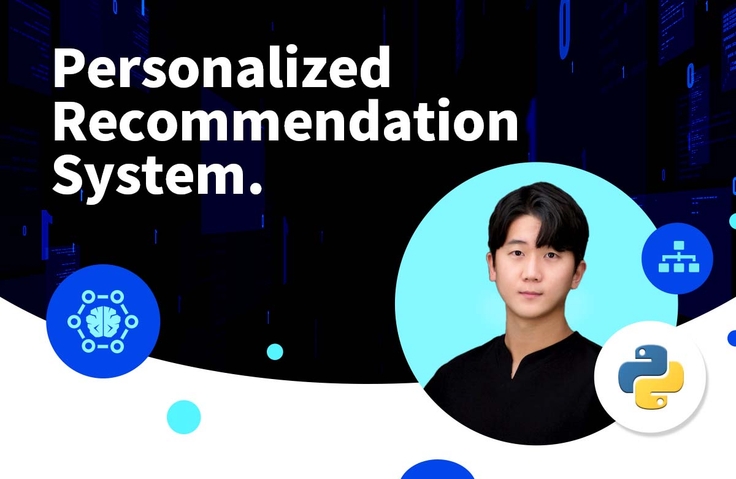
Concepts of Recommendation Algorithms
How various recommendation algorithms work
Implementation of recommendation algorithm using Python
Implementing a personalized recommendation system ✅
Rough but useful with rough coding!

Netflix, Amazon, YouTube, Spotify, etc.
Including world-famous services
A service that utilizes a recommendation algorithm
It's increasing more and more.
“Can I really get my head around the concept of recommendation algorithms ?”
“I understand the concept of recommendation algorithms, but... how do I implement them ?”
👇👇
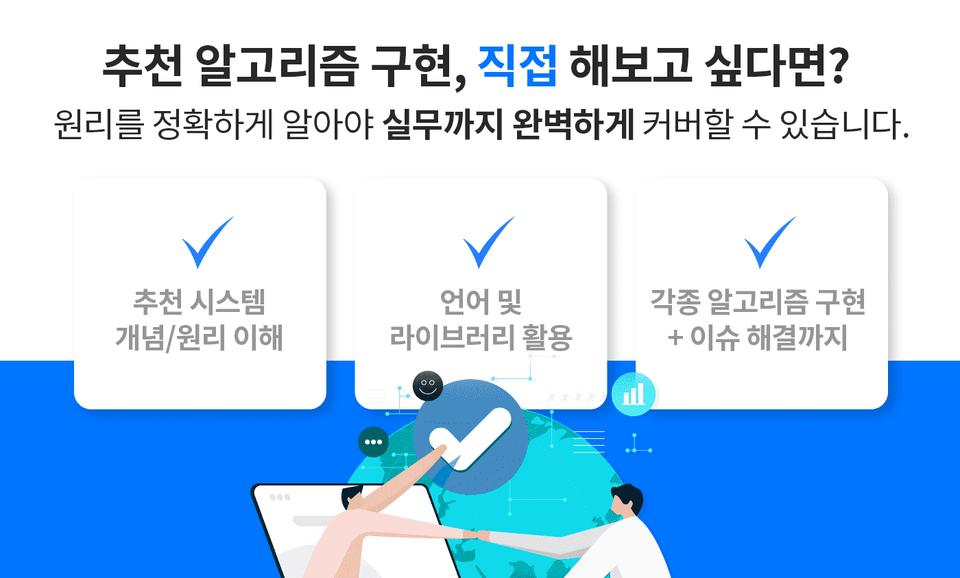
As the number of services utilizing recommendation algorithms continues to increase, the number of people who want to learn about recommendation algorithms continues to increase. In line with this,
Recommendation Algorithms, Why Python?

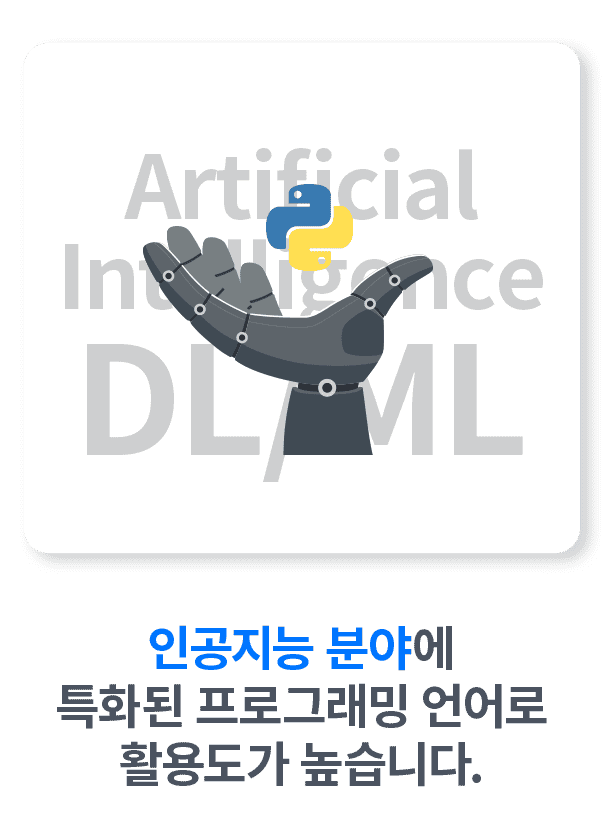
I hope this will be a meaningful time for those who want to learn about recommendation systems and develop practical implementation skills 😊
💻 Check your player knowledge!

Hello! I am Rough Coding, currently working as a data analyst at "One of the Nekaras" .
Have you ever wondered if you can get your head around the concept of recommendation algorithms? You understand them when you read books, but when you actually try to implement the algorithms, you feel lost?
Through this lecture, we will try to establish the foundation of recommendation algorithms by accurately explaining the concepts and operating principles. The lecture is structured so that you can be confident in actual implementation by coding along with the specific operating principles , rather than simply explaining the concepts.

Currently, I am using Python and visualization tools (Tableau) at " One of the Nekara " to collect, process, analyze, predict, visualize, and automate tasks.
Main history
Mentoring in progress

The beginning is the most important thing in everything. If you have any questions while learning, please ask through [Questions/Answers] . I am also conducting mentoring , so I hope it will be of great help to those who are interested in data analysis. 😊

A vague lecture focusing on simple explanations of concepts?
• Information widely available on the Internet
I don't think the lectures are all that different.
• The concept explanation is good,
So how exactly do you actually implement this?
• The language itself is too difficult.

Systematic curriculum, practical lectures focused on practice!
• Not a simple explanation of the concept
This is a practical lecture focusing on principles and practice .
• This is not a lecture that simply collects materials from the web.
I've compiled and compiled authoritative reference books .
• I used Python, which is easy and quick to learn.
There are already many sites that provide simple explanations of recommendation algorithms. However, no matter how good the explanation is, it is useless if it does not lead to an accurate implementation.
In this lecture, we will not only teach you the concept of recommendation algorithms, but also provide you with solid know-how for introducing recommendation systems in the field.
The lecture will be conducted using Python, a language specialized in the field of artificial intelligence that can be learned quickly compared to other programming languages. The lecture is structured so that you can learn not only about the recommended algorithm but also the data engineering required to build an artificial intelligence model.
 Personalized Recommendation System Using Python (Cheongram Publishing, Im Il)
Personalized Recommendation System Using Python (Cheongram Publishing, Im Il)
This is not a lecture that simply gathers knowledge from various sites. The lecture curriculum is systematically organized based on the contents of authoritative reference books.


Orientation
The purpose of this lecture is to understand the working principles of major personalized recommendation algorithms. The purpose and introduction of the lecture are summarized in a 5-minute OT video, so please check it out through [Lecture Preview]!

Introduction to the recommendation system
We will introduce the concept of a recommendation system, various technologies, and its development process that select and present necessary information or products to users based on their past behavior data or other data.
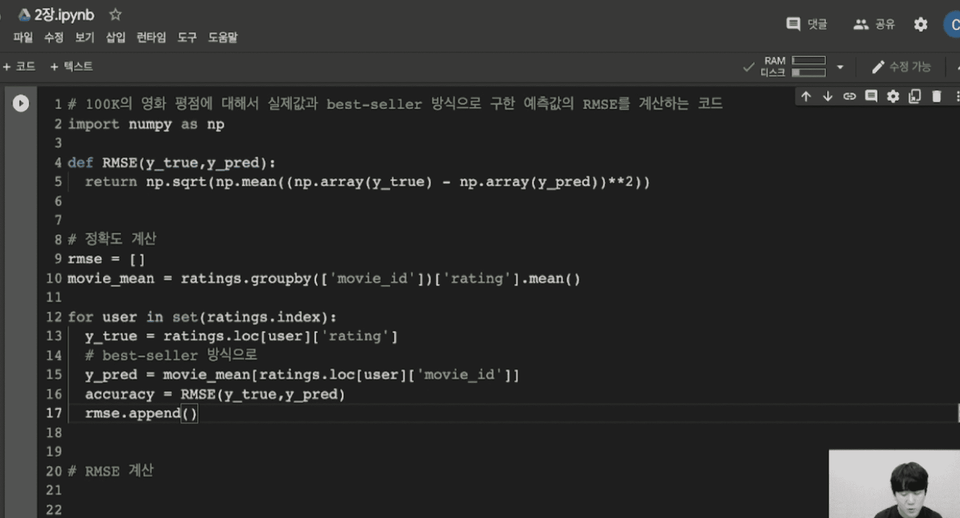
Basic recommendation system
This is a process of preparing and understanding basic data for learning future theories and practices. We will introduce the basic operating principles of the recommendation system.
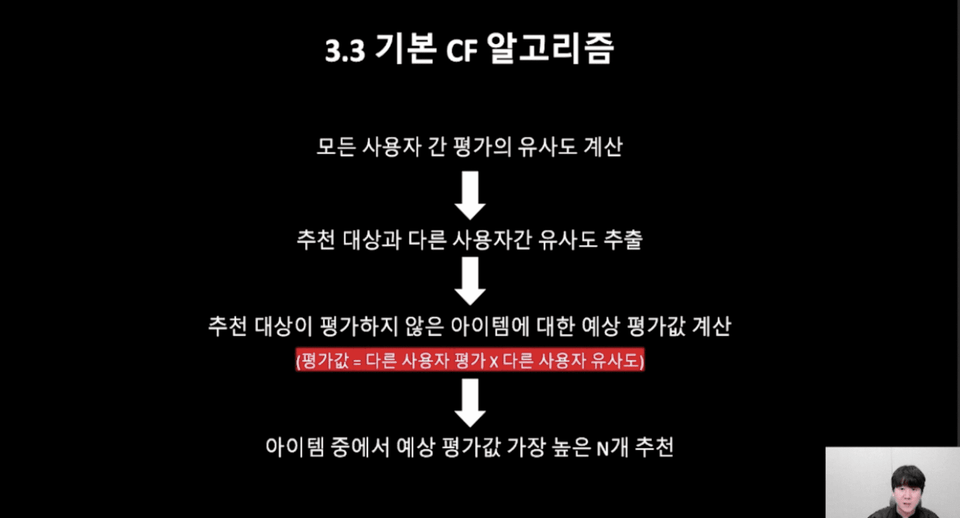
Collaborative filtering recommendation system
We will introduce the concept and operating principles of similarity-based collaborative filtering (CF) and enhance your understanding of the concept by implementing it in practice.
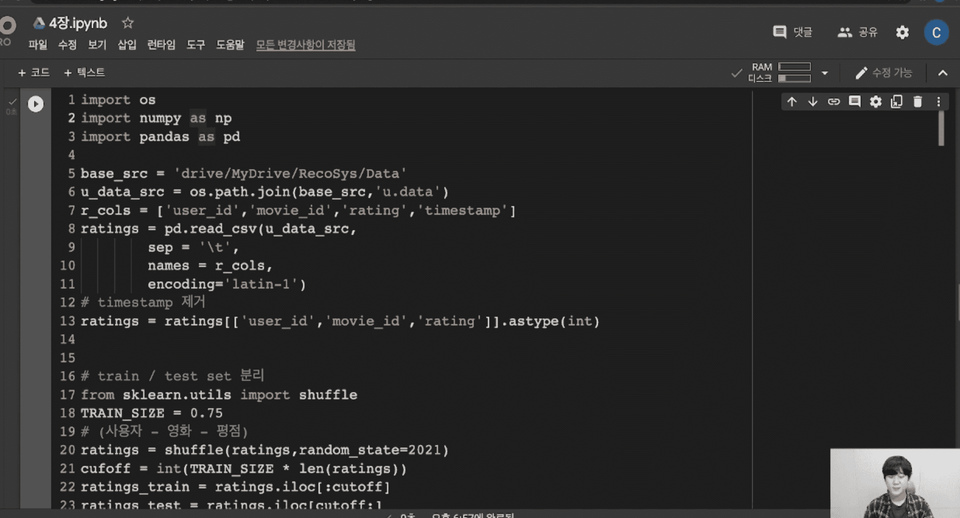
Matrix Factorization(MF) based recommendation
We introduce the concept and operating principles of Matrix Factorization (MF), which is based on matrix operations, and enhance understanding of the concept by implementing it in practice.

Using the Surprise package
Learn the concepts and working principles of a package that allows you to easily implement and test CF and MF-based recommendation systems.

Recommendation system using deep learning
By utilizing the concept of artificial neural networks with multiple hidden layers, we will deepen our understanding of the concept by learning the principles and practices of operating a recommendation system.

Hybrid Recommender System
We will increase understanding through methodological content and practical exercises on how to complement and improve mutual performance by combining multiple recommendation algorithms.

Using Sparse Matrix for Processing Large Data
You will gain a feel for practical skills by learning how to handle unmanageable amounts of data and the process of applying real-world recommendation algorithms.

Issues in building a recommendation system
By summarizing the problems and issues that frequently occur when building an actual recommendation system, you will learn various know-hows that can help reduce the trial and error in the process of creating an actual recommendation system.
Q. Is it necessary to know prerequisite knowledge (Python, Numpy, Pandas, Keras)?
You absolutely must know Python, but you don't have to study other libraries too deeply in advance. I recommend that you find and study only the contents that you don't know from the contents that come up in the lecture. The libraries used in the lecture are very useful and commonly used, so it might be a guideline for beginners to know which ones to study first. 😉
Q. Is the data provided in advance?
Of course. The data used in all lectures will be MovieLens data developed and verified by the GroupLens project at the University of Minnesota. You can download the data through the data URL provided before the class begins.
Q. Can I develop an actual recommendation engine by taking this course?
In every lecture chapter, we cover not only the concepts of various recommendation algorithms, but also practical exercises. So, you can develop your own recommendation engine by making slight modifications to the code we practiced together to suit your domain.
Q. Do I need to install Python separately or set up a separate development environment?
There is no need to do that at all. To eliminate the hassle of installation and development environment setup, we will use Colab, a web environment editor provided by Google.
You can check out more detailed instructions on how to use Colab on my blog or search for "how to use Colab" on Google.
Machine learning starting from Python's basic libraries
The perfect guide to machine learning for beginners! Free lecture
Who is this course right for?
Those interested in personalized recommendation algorithms
Those who want to introduce a recommendation system to their business
Need to know before starting?
Basic understanding of Python
Basic understanding of the Numpy library
Basic understanding of the Pandas library
Basic understanding of the Keras library
6,883
Learners
107
Reviews
101
Answers
4.8
Rating
3
Courses
안녕하세요. 거칠지만 정말 유익한 데이터 분석가 "거친코딩" 입니다.
고려대학교 통계학과 (졸업)
고려대학교 대학원 빅데이터융합학과 (재학)
QS 세계대학평가 평가위원
고려대학교 SW 중심대학 인공지능 심화 수료
고려대학교 KUCC(컴퓨터 동아리) 세션장
고려대학교 학과 5회 수석, 1회 전체 수석
빅데이터분석기사 자격증
빅데이터분석 준전문가(adsp) 자격증
저는 현재 "네카 중 한 곳"에서 파이썬 및 시각화툴(Tableau)를 활용하여 데이터 수집, 가공, 분석, 예측, 시각화, 업무 자동화를 하고 있습니다.
데이터 분석 직무를 꿈꾸는 학생들을 위한 효율적 공부법
데이터 분석 현업에 있는 주니어 분석가를 위한 상담
현업에서 IT직군이 아니지만, IT 기술을 활용하여 본인 업무에 적용하고 싶은 분
zoom을 통한 비대면 방식 진행
준비물 : 컴퓨터, 카메라, 이어폰
미리 준비한 질문 사항 혹은 현 상황에 따라 멘토링 진행
모든 일에는 시작이 가장 중요합니다. 뜨거운 열정으로 이루고자 하는 것을 꼭 이뤄냅시다!..
rough_coding@naver.com
All
42 lectures ∙ (6hr 14min)
Course Materials:
All
41 reviews
4.7
41 reviews
Reviews 2
∙
Average Rating 4.0
5
This course is for intermediate and advanced experts who want to actually implement recommendations. ^^ It's good because it contains content that is not easily seen.
Thank you for leaving a good review. As you said, I tried to make it not just a concept, but only practical content for actual implementation :) This lecture is not the end, and I will come back with more interesting recommended topics. Thank you. -Rough Coding Dream-
Reviews 13
∙
Average Rating 4.2
3
Everything is good, but I don't understand why they don't provide PDFs. They say that's for learning purposes..? I don't understand what they're talking about at all. The lectures are good. But isn't it obvious that they should share the PDFs that they use by default?? Or at least specify before payment that they won't share the PDFs; it really pisses me off.
Reviews 13
∙
Average Rating 4.9
5
Thanks to this, my understanding of recommender systems has greatly improved. It's a really great lecture!
I'm so happy to hear that you've improved your understanding :) Please continue to work hard for the remaining classes~! If you have any questions, please leave them on the community Q&A board. Thank you. - Rough Coding Dream-
Reviews 2
∙
Average Rating 5.0
5
I learned the concept of recommendation algorithms from information scattered on various blogs...ㅠㅠㅠㅠ It's nice to have it all organized in one place. I'm about to take a practical class, so I'll work hard!
As you said, there are many blogs that cover the concept of recommendation algorithms, but there are many that are not continuous or lack information. I hope you can establish a clear concept through this opportunity~! Fighting for practice too!! -Rough Coding Dream-
Reviews 3
∙
Average Rating 5.0
5
I'm planning to introduce a recommendation system as an in-house service this time, and I think it will be really helpful.
Comments like this really give me a sense of accomplishment...ㅠ Thanks to this lecture, I will return with a more unique recommendation algorithm lecture in the next lecture. If you have the opportunity to introduce it to your company, I would really appreciate it if you could leave a review about it. -Rough Coding Dream-
Limited time deal ends in 6 days
$30,800.00
30%
$34.10
Check out other courses by the instructor!
Explore other courses in the same field!